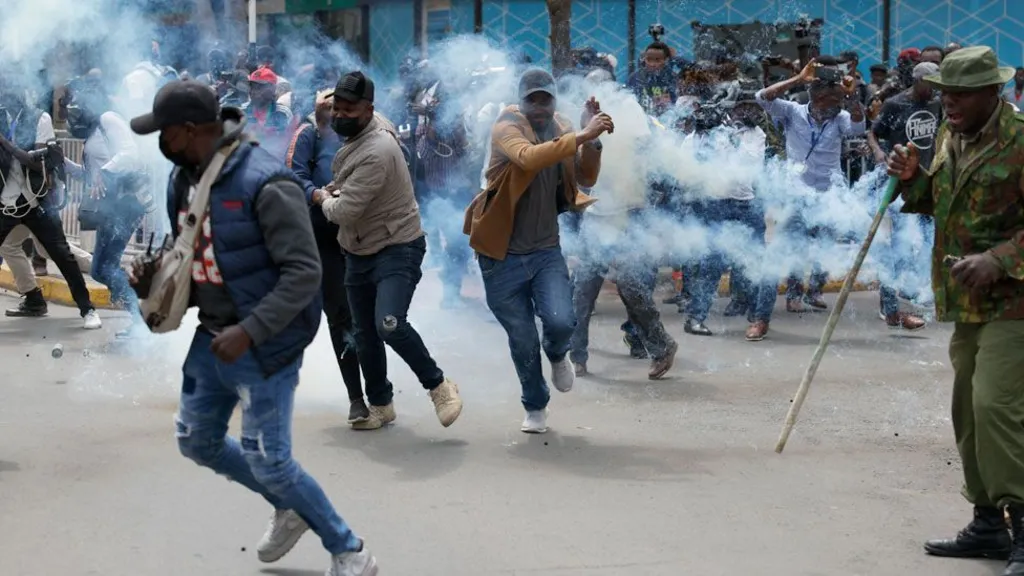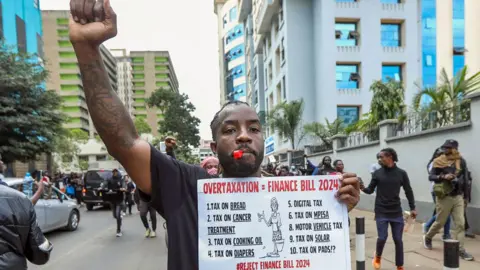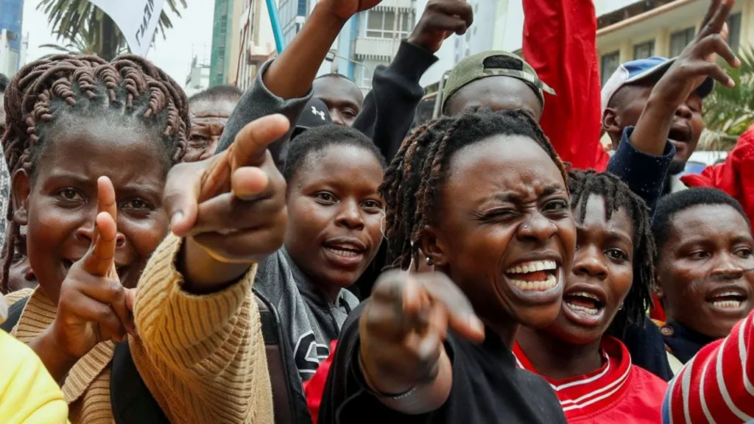A bold and new generation of young Kenyan protesters has emerged on the streets forcing the government to back down on some of a slew of unpopular tax proposals.
What started as anger on TikTok about a controversial finance bill has morphed into a revolt - without being organised by political parties.
The government of President William Ruto has managed to do what generations of politicians in the East African nation have failed to do - unite huge numbers of Kenyans beyond ethnicity and party.
On Tuesday, hundreds of trainer-wearing protesters, who feel Kenyans are already overtaxed with little to show for it, braved tear gas lobbed by police to march through the capital, Nairobi, bringing the city's central business district to a standstill.
Armed with their smartphones, they live-streamed the intense confrontations with officers.

The protests, dubbed "occupy parliament", were coordinated and mobilised on social media in contrast to those led and sponsored by politicians.
Organisers encouraged fellow protesters to wear black clothes, but some still turned up in ripped jeans and stylish hairdos.
The youthful demonstrators, popularly referred to as Gen Zs - in reference to the term generally used to describe those born during the late 1990s and early 2000s - showed up in huge numbers, vowing to ensure that their discontent did not end with just a hashtag or meme.
“We are the Gen Zs, we were able to mobilise ourselves. We use TikTok as a space to be able to not only have young people come to protest but to educate them on the why,” protester Zaha Indimuli told journalists.
Many of them were demonstrating for the first time and waved signs such as "Do Not Force The Taxes On Us" , while others chanted: “Ruto must go”.
"I’m here slaving for a country I love. It is the first time I'm doing this because my parents are old and they cannot do it any more," Ken Makilya, a 24-year-old university student, told the BBC.

The hashtags used to pressure MPs and rally protesters were "#OccupyParliament" and "#RejectFinanceBill2024".
“This is my first demonstration. I hope it will be the last. I hope things change after this," said Naserian Kasura, who opposed the proposal to tax sanitary pads.
The protesters' efforts to march to parliament were thwarted as police used water cannon to block them.
"We have been arrested but don’t let them get to you please proceed to parliament," Hanifa Farsafi, reportedly one of the organisers, posted on X, formerly Twitter.
More than 200 young protesters were arrested but some of them were later released after lawyers went to the police stations where they had been detained.
“I am not going, I am not cooperating, why are you arresting me?” one protester was heard saying in a viral video as she refused to board a police vehicle.

Those who did not make it to the streets helped spread the word by sharing messages, pictures and videos on social media.
As the protest lacked any clear leadership, the police have found it hard to target those behind it. They banned the march on a technicality though the protesters said all requirements had been met.
And unlike previous political anti-government protests, it was not characterised by looting, destruction of property and stone-throwing.
No political affiliations or ethnic alignments were mentioned - just a clear determination by the protesters to be heard.
Several hours after the demonstrators had mobilised, the presidency appeared to bow to the pressure and announced that it would scrap some of the bill's most contentious provisions, including a proposed 16% value-added tax (VAT) on bread.
"We have listened to the view of Kenyans,” Kuria Kimani, the chairman of parliament's finance committee, said at a press briefing attended by President Ruto and lawmakers in the ruling coalition.
Changes to the finance bill were driven by a “need to protect Kenyans from increased cost of living”, Mr Kimani added.
The government had earlier defended the tax hikes, which had been projected to raise $2.7bn (£2.1bn), saying they were needed to cut reliance on external borrowing.
Other proposed taxes that have been axed include ones on cooking oil, mobile money services and on motor vehicles, which critics said would have hit the insurance industry.
MPs are now debating the revised bill and are expected to vote on it next Tuesday.
The opposition, which did not participate in the demonstrations, wants the withdrawal of the entire bill, terming it "punitive".

Another hashtag being used by the campaigners is "#unfollowRuto", encouraging people to stop following the president on X in a bid to pressure him to drop the bill.
They have vowed to continue with the protests in Nairobi and other cities until the bill is dropped altogether
A few days ago, presidential adviser David Ndii had rudely dismissed online efforts that started on TikTok around two weeks ago, but following Tuesday's show of strength, he acknowledged their achievement.
Following the publication of the draft bill, TikTokers began making video explainers that were widely shared on other platforms like WhatsApp, Facebook, Instagram and X - that would trend for days helped by pushes from Kenyan influencers.
One tactic that has forced MPs to take notice is the list of their phone numbers that has been shared across social media with the message "SMS your MP".
MP Stephen Mule told local media that his phone was spammed with more than 30,000 messages from young Kenyans asking him to reject the bill. Other legislators have also complained that their phones have become practically unusable because of the number of texts they were receiving.
Local media have also picked up the online conversations, amplifying the voices of protest and issues about the cost of living.
Some urged veteran opposition leader Raila Odinga, who has been the face of anti-government protests for years, to stay away from Tuesday's march.
He obliged, posting on social media: "I’m a very proud father today! Well done to all those who bravely stood up for their rights!"

Mutuma Mathiu, a veteran journalist, said Tuesday's events had shifted the dynamics of Kenyan politics: "Protest politics found a new fulcrum and a new and different generation of Kenyans found their rather loud voice."
Popular political commentator Pauline Njoroge agreed: “They are not just brave, they are also very cool and well-spoken. Today’s youth-led protest has been the most peaceful yet very successful."
Prof Kivutha Kibwana, a law scholar and a former county governor, urged dialogue in his post on X: "The most dangerous thing for a government to do is to declare war on its youth."
Dr Willy Mutunga, a former chief justice, said young people across the world had a common enemy in "their respective ruling classes, warning: "The uprising is on the horizon."
The government has long held fears that social media could be used to promote discord and has pushed for stricter oversight by regulators.
The online collective known as Kenyans on X (XOT) is renowned for calling out issues and Kenya is among the countries with the highest TikTok usage rate worldwide.
In March, the interior minister threatened to restrict the use of TikTok, which he accused of spreading malicious content.
But the protesters do not intend to be cowed.
"We are not scared, we are not moved and this is only the beginning of the revolution. We are coming, we are many and in good numbers," said Ms Indimuli from the sidelines of Tuesday's demonstration.
Latest Stories
-
Government renames UHAS after late Prof Mills
16 minutes -
Wontumi spends night in EOCO custody after failing to meet bail conditions
42 minutes -
Students say they ‘regret’ applying to US schools after visa changes
56 minutes -
Christopher Bonsu Baah stars on Black Stars debut against Nigeria
1 hour -
Musk ‘disappointed’ by Trump’s tax and spending bill
1 hour -
French paedophile surgeon who abused hundreds sentenced to 20 years in jail
1 hour -
Chelsea win UEFA Europa Conference League after comeback win over Real Betis
1 hour -
Glacier collapse buries most of Swiss village
1 hour -
The Case for Reparations: A focus on Ghana
2 hours -
Nana Ampofoa Initiative tackles menstrual hygiene challenges among underprivileged female prisoners
2 hours -
2025 Unity Cup: Black Stars to settle for third-place playoff after defeat to Nigeria
2 hours -
UHAS renamed in honour of late Prof. Atta Mills
2 hours -
Wontumi granted GH¢50m bail by EOCO
2 hours -
Access Bank and DHL forge strategic partnership to empower African SMEs in global trade
3 hours -
AUCB appoints Frank Adu as first Chancellor
3 hours

